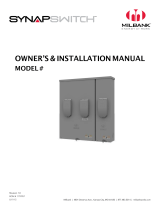
7
Installation
We sincerely appreciate your patronage. For this
reason, we have made every effort to provide for a safe,
streamlined and cost-effective installation. Because
each installation is unique, it is impossible to know of
and advise the trade of all conceivable procedures and
methods by which installation might be achieved. Neither
could we know of possible hazards and/or the results of
each method or procedure. For these reasons,
Only current licensed electrical and plumbing
professionals should attempt home generator system
installations. Installations must strictly comply with all
applicable codes, industry standards and regulations.
Your home generator is supplied with this “Operator’s
Manual” and a separate “Installation Manual”. These
are important documents and should be retained by the
owner after the installation has been completed.
This product is only for use as an optional generator system
which provides an alternate source of electric power and
to serve loads such as heating, refrigeration systems, and
communication systems that, when stopped during any
power outage, could cause discomfort or inconvenience.
NOTICE This product does NOT qualify for either an
emergency standby or legally required standby system
as defined by NFPA 70 (NEC).
• Emergency generator systems are intended
to automatically supply illumination, power,
or both, to designated areas and equipment
in the event of failure of the normal supply.
Emergency systems may also provide power for
such functions as ventilation where essential to
maintain life, where current interruption of the
normal supply would produce serious life safety
or health hazards.
• Legally Required standby generator systems
are intended to automatically supply power
to selected loads in the event of failure of the
normal source which could create hazards or
hamper rescue or fire-fighting operations.
Every effort has been made to ensure that information in
this manual is accurate and current. However, we reserve
the right to change, alter, or otherwise improve the product
and this document at any time without prior notice.
Only current licensed electrical and plumbing professionals
should attempt home generator system installations.
Installations must strictly comply with all applicable codes,
industry standards, laws and regulations.
For the Home Owner:
To help you make informed choices and communicate
effectively with your installation contractor(s), read and
understand Owner Orientation in this manual before
contracting or starting your generator installation.
To arrange for proper installation, contact the store at
which you purchased your generator, your dealer, a
licensed electrician or your utility power provider.
The generator warranty is VOID unless the
system is installed by licensed electrical and
plumbing professionals.
Every effort has been made to ensure that information in
this manual is accurate and current. However, we reserve
the right to change, alter, or otherwise improve the product
and this document at any time without prior notice.
The Emission Control System for this generator is warranted
for standards set by the U.S. Environmental Protection
Agency and by the California Air Resources Board (CARB).
For the Installing Dealer/Contractor:
For most applications, the installation manual contains
all the information required to properly install and
start the generator. This operator’s manual describes
routine operation and owner maintenance procedures.
If you need more information in this matter, please call
at 800-743-4115 between 8:00 AM and 5:00 PM CT.
Owner Orientation
This section provides generator owners with the
information necessary to achieve the most satisfactory
and cost effective installation possible.
The illustrations are for typical circumstances and
are meant to familiarize you with the installation
options available with your generator. A thorough
understanding of these options will provide
fundamental control over the cost of your installation,
as well as ensure your final satisfaction and security.
Federal and local codes, appearance, noise levels,
fuel types, and distances are the factors that must
be considered when negotiating with an installation
professional. Remember that as the distance from the
existing electrical service and gaseous fuel supply
increases, and the number of 90 degree bends in the
fuel supply increases, compensations in piping and
wiring materials must be made. This is necessary
to comply with local codes and overcome electrical
voltage drops and gaseous fuel pressure drops.
The factors mentioned above will have a direct affect
on the overall price of your generator installation.
In some areas you may need to acquire electrical
permits for installing the generator, building permits for
installing gas lines, and permits for noise allowances.
Your installer should check your local codes AND
obtain the permits before installing the system.




















